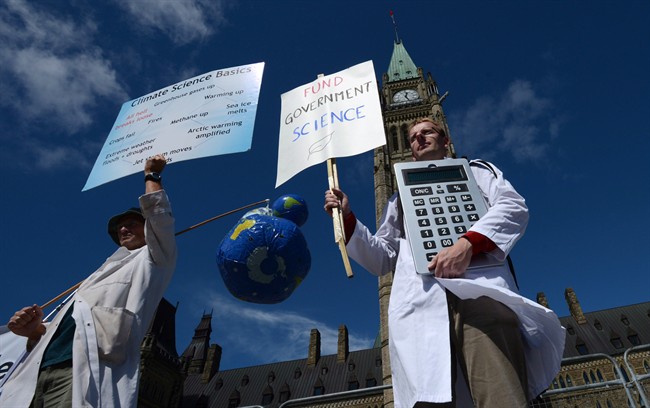TORONTO – Nine out of ten government scientists feel muzzled, according to a new survey conducted by The Professional Institute of the Public Service of Canada (PIPSC).

Members of the union sent out invitations to 15,398 federal scientists to participate in the online survey which ran from June 5 to 19, 2013. Of that number, 4,069 participated in the questionnaire conducted by Environics.
“We’ve been hearing anecdotal evidence over the past few years about what’s happening to scientists who work for the government and we wanted to basically to gather information about this,” said Gary Corbett, president and chief executive officer of PIPSC. “It gives us an indication of what was in the past anecdotal, that there are what I called systemic and non-systemic issues that keep scientists from talking to the media or the public.”
Click here for report.
The Harper government has been criticized about its scientific policies and its lack of public openness when it comes to science. It has even garnered worldwide attention in both mainstream and professional circles.
Information commissioner Suzanne Legault is conducting an investigation into federal policies following a 128-page report that asked her to investigate the claims that scientists were not free to speak to the public about their findings.
Following PIPSC’s survey results, Minister of State (Science and Technology, and Federal Development Initiative for Northern Ontario) Greg Rickford issued the following statement:
“Our Government has made record investments in science. As such, Canada is ranked number one in the G-7 for our support for research and development in our colleges, universities and other institutes. We are working to strengthen partnerships to get more ideas from the lab to the market-place and increase our wealth of knowledge. Science can power commerce, create jobs, and improve the quality of life for all Canadians.”
The survey findings, entitled “The Big Chill,” also found that 86 per cent of federal scientists did not believe that they could share their concerns with the public or media without censure – even if it concerned action that could harm public health, safety or the environment.
Read more: Scientists across Canada rally to protest Harper government
More concerning is that 24 per cent had been directly asked to exclude or alter information for non-scientific reasons.
The survey also found that 70 percent of federal scientists believe that Canada’s ability to develop policy and laws are being compromised with this kind of federal interference.
“Our members are hired by the government to do public science, the type of science that informs policy, whether it be air transportation safety, food safety,” said Corbett. “I mean…this science is meant to inform public policy decision-making… That could mean an increase risk for Canadians in terms of some of the things the policies inform.”
PIPSC has approximately 57,000 members, 15,000 of which have been identified as government scientists.
Corbett said that PIPSC plans to continue conducting similar surveys in the future.
- Toronto’s offices are emptying out. The city wants to know what to do with them
- Capital gains changes could have ‘irreversible’ effects, business groups warn
- Could notwithstanding clause be used on abortion? Poilievre’s office says ‘never’
- U.K. takes aim at allies like Canada, wants higher NATO targets





Comments